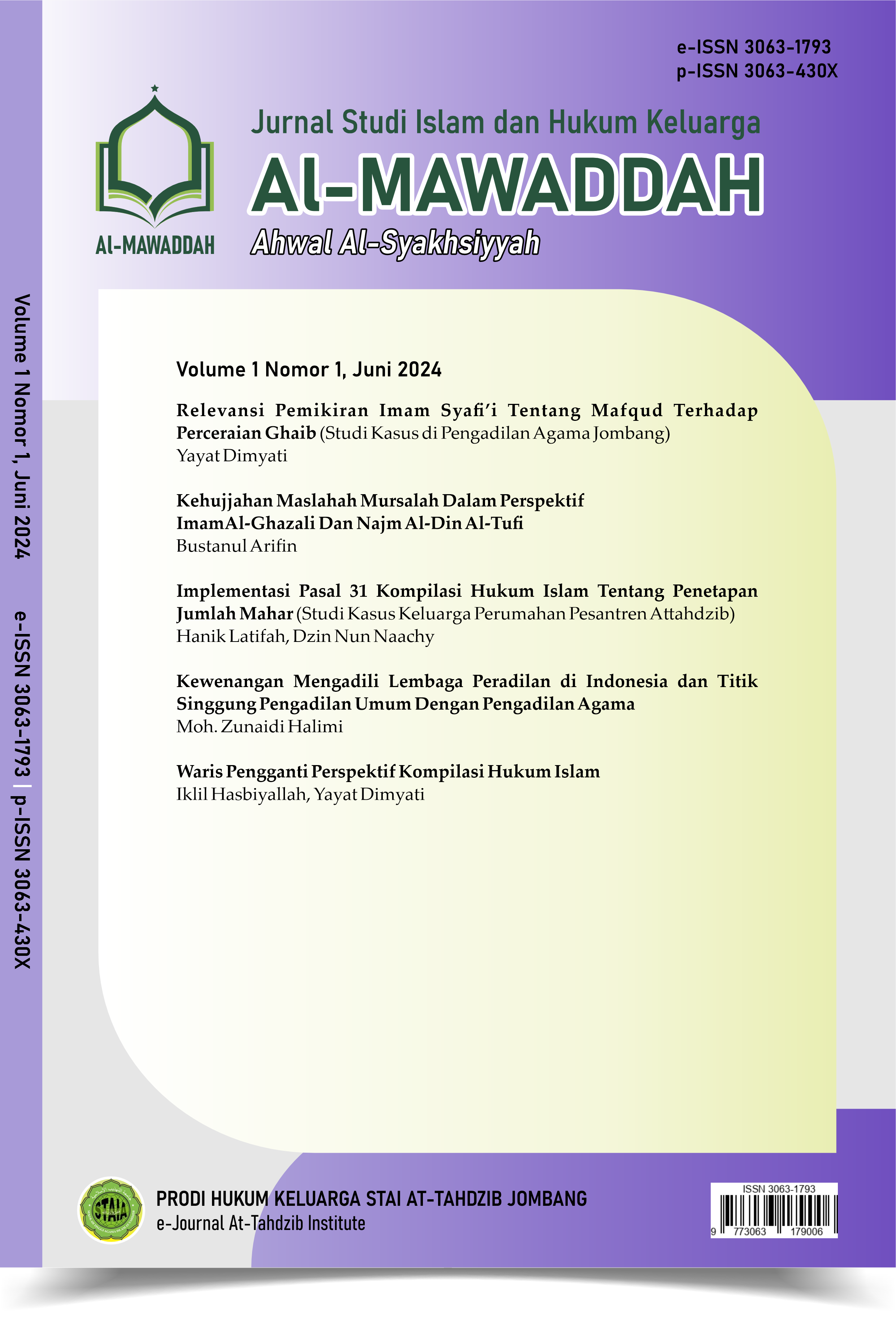Kewenangan Mengadili Lembaga Peradilan di Indonesia Dan Titik Singgung Pengadilan Umum Dengan Pengadilan Agama
DOI:
https://doi.org/10.61181/al-mawaddah.v1i1.428Keywords:
Authority, General court, Judge, Religious courtsAbstract
The court as an officially legitimate (legitimate) state institution is given the authority to examine, adjudicate, decide and resolve every dispute submitted to it. The Court's authority, practical and theoretical, is divided into two, namely absolute authority (absolute competency) and relative authority (relative competency, jurisdiction). The method used is literature review, which is a systematic, explicit and reproducible method for identifying, evaluating and synthesizing research works and ideas that have been produced by researchers and practitioners. The type of research that researchers used in preparing this article is research. Qualitative, this kind of research is descriptive and tends to use analysis with an inductive approach. This type of qualitative research is in the form of library research. As far as current practical experience is concerned, the authority of district courts and religious courts often experiences points of contact. Apart from historical factors, incomplete factors and lack of clear explanations in the law give rise to different interpretations regarding the authorities in certain cases. Moreover, the absolute authority of religious courts is based on the principle of Islamic personality, which means that submission to the provisions of Islamic law is the basis for the legitimacy of the authority of religious courts in certain cases. Submission to Islamic provisions as the basis for the meaning of Islamic personality no longer only means formal Muslims (based on legal identity), but also non-Muslims who submit themselves to the provisions of Islamic law. Below are several points regarding the authority of the District Court and the Religious Court.
References
Abdul Manaf, Refleksi Beberapa Materi Cara Beracara di Lingkungan Peradilan Agama, Bandung: Mandar Maju, 2008.
Andi Prastowo, Metode Penelitian Kualitatif Dalam Perspektif Rancangan Penelitian, (Yogyakarta: Ar-Ruzz Media, 2012) Cet. II
Boedi Abdullah dan Beni Ahmad Saebani, Metode Penelitian Ekonomi Islam (Muamalah) (Bandung: Pustaka Setia, 2014)
Henry Campbell Black, 1968, Black’s Law Dictionary (Revised Fourth Edition), Minnesota: West Publishing.
Jonathan Sarwono, Metode Penelitian Kuantitatif Dan Kualitatif, (Yogyakarta: Graha Ilmu, 2006).
Kholid Narbukoi dan Abu Achmadi. Metode Penelitian, Memberikan Bekal Teoritis pada Mahasiswa tentang Metode Penelitian serta Diharapkan Dapat Melaksanakan Penelitian dengan Langkah Langkah yang Benar, (Jakarta: Bumi Aksara, 2008), cet. 9.
M. Yahya Harahap, Hukum Acara Perdata: Tentang Gugatan, Persidangan, Penyitaan, Pembuktian, dan Putusan Pengadilan, Jakarta: Sinar Grafika, 2007.
M. Yahya Harahap, Segi-segi Hukum Perjanjian, Bandung: Alumni, 1986.
Mahkamah Agung RI, Pedoman Pelaksanaan Tugas dan Administrasi Pengadilan dalam Empat Lingkungan Peradilan, 2007.
R. Soeroso, 1994, Praktik Hukum Acara Perdata: Tata Cara dan Proses Persidangan, Jakarta: Sinar Grafika.
Riduan Syahrani, Himpunan Peraturan Hukum Acara Perdata Indonesia, Bandung: Alumni, 1991.
Rulam Ahmadi. Metodologi Penelitian Kualitatif. (Yogyakarta: Ar-Ruzz Media, 2016).
Sugiyono, Metode Penelitian Kuantitatif dan Kualitatif R&D, (Bandung: Alfabeta, 2013) cet. 22
W. Riawan Tjandra, Teori & Praktik Peradilan Tata Usaha Negara, Yogyakarta: Universitas Atma Jaya, 2014.
Downloads
Published
Issue
Section
License
Copyright (c) 2024 Moh. Zunaidi Halimi

This work is licensed under a Creative Commons Attribution-ShareAlike 4.0 International License.




